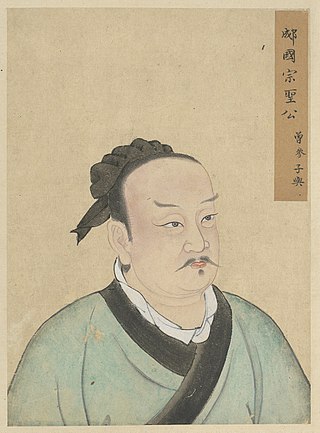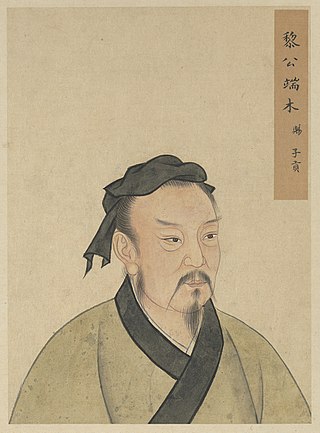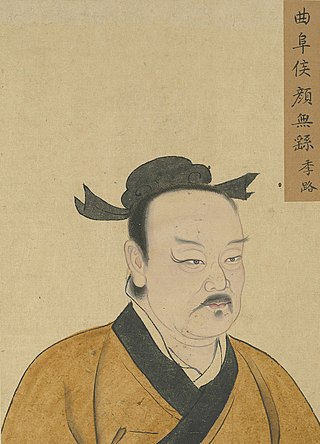
Confucius was a Chinese philosopher and politician of the Spring and Autumn period who is traditionally considered the paragon of Chinese sages. Confucius's teachings and philosophy underpin East Asian culture and society,remaining influential across China and East Asia to this day.

The Analects,also known as the Analects of Confucius,the Sayings of Confucius,or the Lun Yu,is an ancient Chinese book composed of a large collection of sayings and ideas attributed to the Chinese philosopher Confucius and his contemporaries,traditionally believed to have been compiled and written by Confucius's followers. It is believed to have been written during the Warring States period,and it achieved its final form during the mid-Han dynasty. By the early Han dynasty the Analects was considered merely a "commentary" on the Five Classics,but the status of the Analects grew to be one of the central texts of Confucianism by the end of that dynasty.
According to Sima Qian,Confucius said:"The disciples who received my instructions,and could themselves comprehend them,were seventy-seven individuals. They were all scholars of extraordinary ability." It was traditionally believed that Confucius had three thousand students,but that only 72 mastered what he taught. The following is a list of students who have been identified as Confucius's followers. Very little is known of most of Confucius's students,but some of them are mentioned in the Analects of Confucius. Many of their biographies are recorded in the Sima Qian's Shiji. The Six Arts were practiced by the 72 disciples.

Zeng Shen,better known as Zengzi,courtesy name Ziyu,was a Chinese philosopher and disciple of Confucius. He later taught Zisi,the grandson of Confucius,who was in turn the teacher of Mencius,thus beginning a line of transmitters of orthodox Confucian traditions. He is revered as one of the Four Sages of Confucianism.
Namgung is an East Asian surname that sees varying levels of use in Vietnam,China,Japan,and Korea.

Ran Geng,also known by his courtesy name Boniu,was one of the most prominent disciples of Confucius. Confucius considered him his third best disciple,after Yan Hui and Min Sun,in terms of moral conduct.

Ran Yong,also known by his courtesy name Zhonggong,was one of the prominent disciples of Confucius. Confucius thought highly of his excellent moral conduct,and considered him fit to be the ruler of a state. After completing school,he served as chief officer of Jisun,the noble clan that dominated the politics of Lu.

Ran Qiu,also known by his courtesy name Ziyou and as Ran You,was a leading disciple of Confucius. Among Confucius's disciples,he was the foremost in terms of ability and accomplishment in statesmanship. As a military commander of the State of Lu,he repelled an invasion from the neighbouring State of Qi. His influence in Lu facilitated the return of Confucius to his native state after fourteen years of exile.

Zhong You,commonly known by his courtesy names Zilu and Jilu,was one of the best known and most faithful disciples of Confucius. Among Confucius's disciples,he was the second in terms of ability and accomplishment in statesmanship,after Ran Qiu. He was noted for his valour and sense of justice,but Confucius often warned him against acting without forethought. He was killed in the State of Wey in defence of his lord Kong Kui.

Duanmu Ci,also known by his courtesy name Zigong,was a Chinese businessman,philosopher,and politician. He was one of the most important and loyal disciples of Confucius. Among Confucius' students,he was the second best at speech,after only Zai Yu. He was a prominent diplomat of the Spring and Autumn period who served as a high official in several states,and was a very wealthy businessman.

Yan Yan,also known by his courtesy name Ziyou and as Yan You or Yanzi,was a prominent disciple of Confucius,considered by Confucius to be his most distinguished disciple in the study of the classics. A native of the state of Wu,he was the only known southerner among Confucius' disciples.
Zhuansun Shi,commonly known by his courtesy name Zizhang,was a prominent disciple of Confucius,who accompanied Confucius in his travels abroad,and later started his own sect of Confucianism.
Fu Buqi,also pronounced Mi Buqi,was a major disciple of Confucius. He was also known by his courtesy name Zijian. He was known as a capable governor and was also a writer.
Yuan Xian,courtesy name Zisi or Yuan Si,was a Chinese philosopher who was a major disciple of Confucius. Classic Chinese sources stated he was modest and incorruptible,and adhered strictly to the teachings of Confucius despite living in abject poverty.
Gongye Chang,courtesy name Zichang,was a major disciple and the son-in-law of Confucius. Little is known about his life,but Chinese legends attribute to him the ability to understand birds' language.

Zeng Dian,courtesy name Zixi,also known as Zeng Xi,was one of the earliest disciples of Confucius. He is known for a passage in the Analects in which he expressed his ambition as no more than being content with daily life. He was the father of Zeng Shen,or Master Zeng,one of the most prominent disciples of Confucius.

Yan Wuyou,courtesy name Lu (路),also known as Yan Lu,was a Chinese philosopher. He was one of the earliest disciples of Confucius. He was the father of Yan Hui,Confucius' favourite disciple.
Shang Qu,courtesy name Zimu,was a disciple of Confucius. He studied the I Ching from Confucius,and is credited with the preservation and transmission of the classic.

Qidiao Kai,courtesy name Zikai or Ziruo,was a major disciple of Confucius. He declined to take government office,but started his own school,which developed into one of the eight branches of Confucianism identified by Han Fei. His work,known as the Qidiaozi,has been lost.

Gongbo Liao,courtesy name Zizhou,was a disciple of Confucius. He was born in the State of Lu,Confucius' native state. His years of birth and death are unknown.













